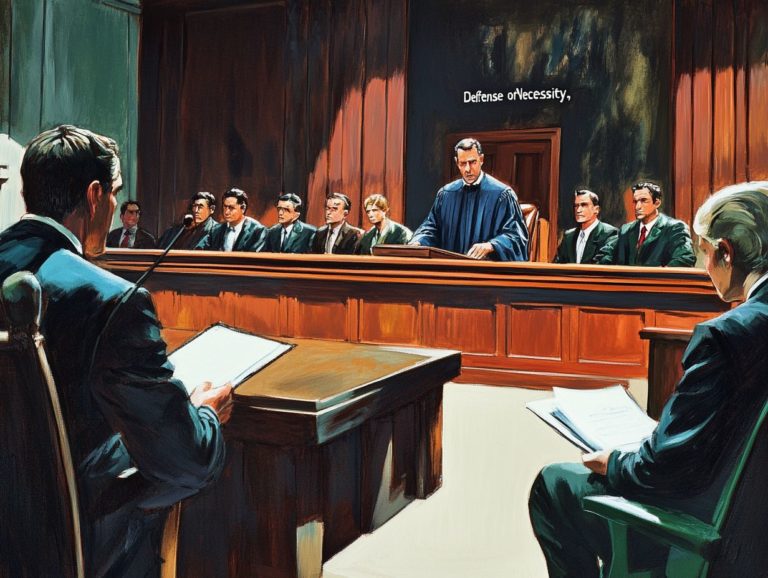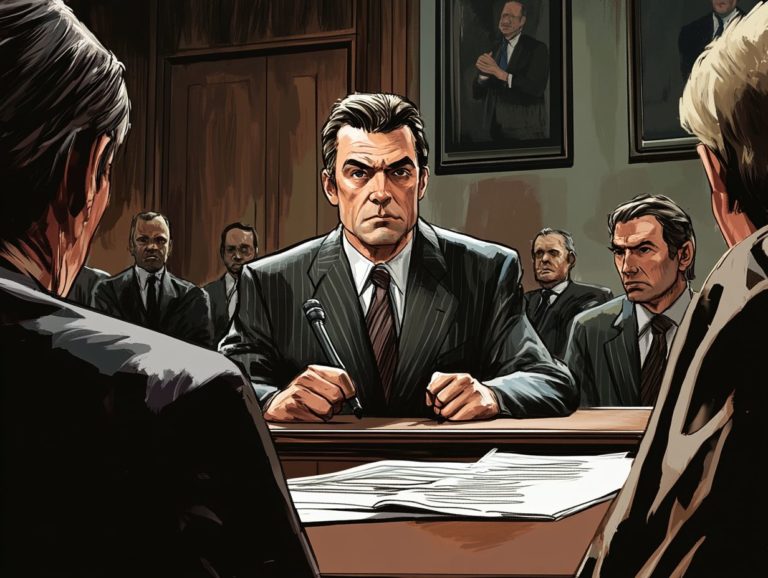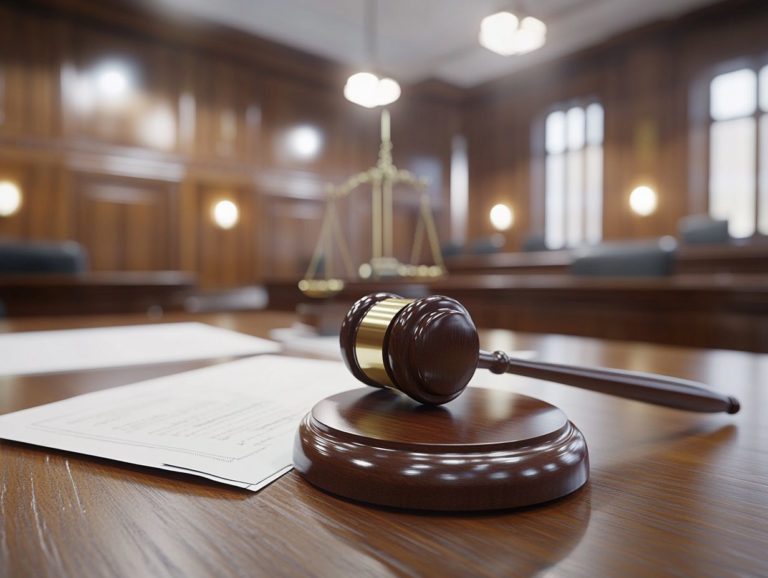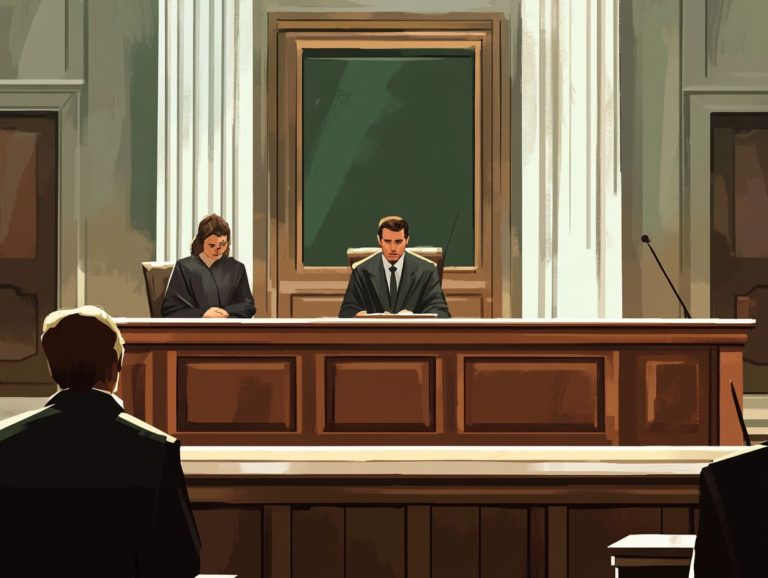The Impact of Prior Convictions on Defense
Navigating the legal landscape can feel overwhelming. This is especially true when prior convictions are involved. It’s essential to understand how these past offenses can shape your current defense strategies, especially if you’re facing legal challenges.
In this article, you will discover the definition and various types of prior convictions. We will examine their legal consequences and the factors that can either intensify or lessen their impact. You will also learn effective strategies to address these convictions, with a strong emphasis on the crucial role of skilled legal representation. Don’t miss out on understanding how these factors can affect your future!
Whether you find yourself as a defendant or simply have an interest in the justice system, this comprehensive guide aims to equip you with valuable insights.
Contents
- Key Takeaways:
- Understanding Prior Convictions
- How Prior Convictions Affect Defense
- Factors that Influence the Impact of Prior Convictions
- Strategies for Addressing Prior Convictions in Defense
- The Importance of Legal Representation
- Frequently Asked Questions
- Curious about prior convictions?
- What is the impact of prior convictions on a criminal defense?
- Can prior convictions be used against a defendant in court?
- What types of prior convictions can be used against a defendant in court?
- How can prior convictions impact a defendant’s credibility as a witness?
- Can a defendant’s prior convictions be expunged or sealed?
- How can a criminal defense lawyer help with prior convictions?
Key Takeaways:
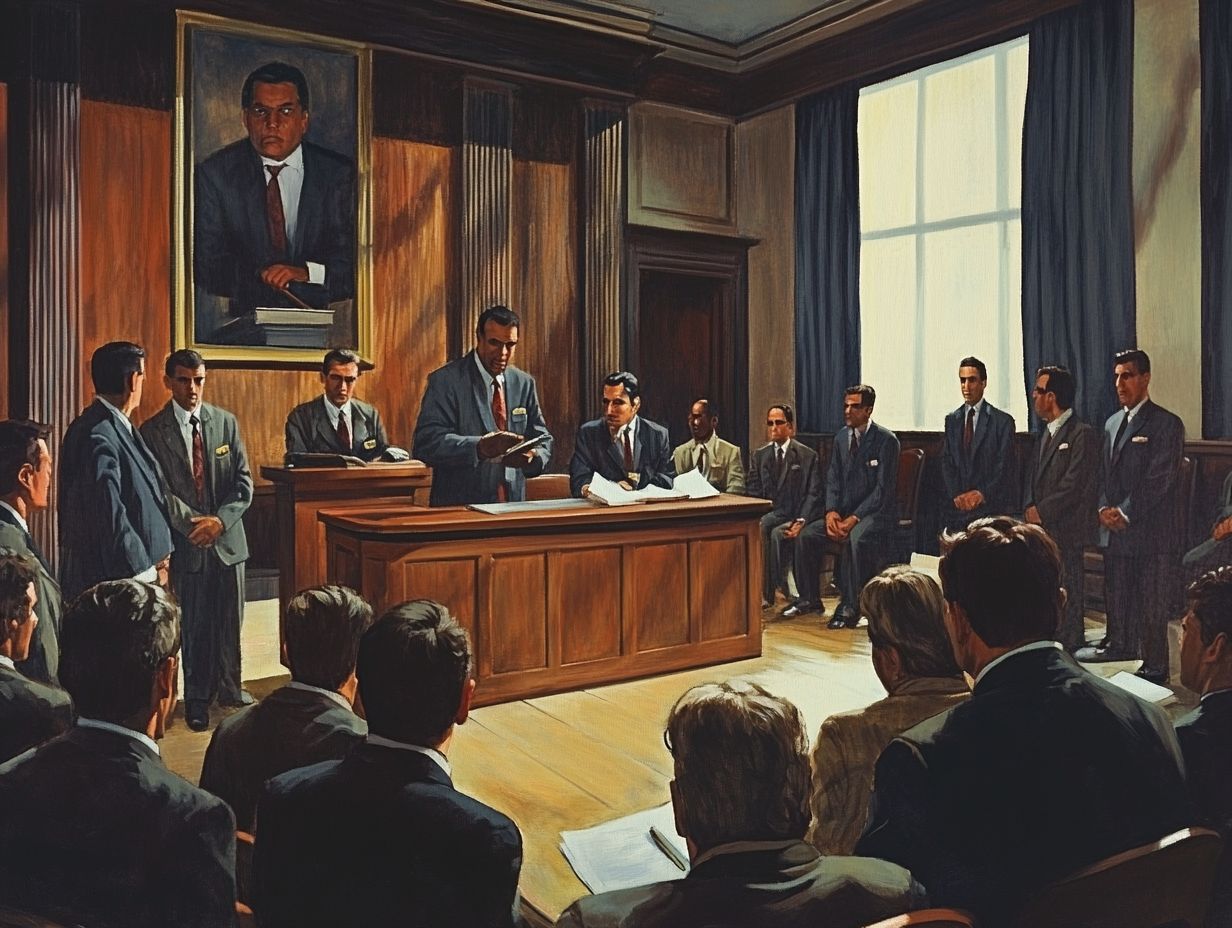
- Prior convictions can have significant legal consequences and implications on a defense case.
- The severity and timing of prior convictions, as well as efforts towards rehabilitation, can influence their impact.
- Effective strategies for addressing prior convictions in defense include disclosure, mitigation, expungement, and seeking legal representation.
Understanding Prior Convictions
Understanding prior convictions is essential in the realm of criminal law, as they greatly impact the legal process and the outcomes of criminal cases.
In jurisdictions such as Michigan, the nature and severity of a prior conviction can significantly influence sentencing enhancements, regardless of whether the case involves a felony or a misdemeanor.
Recognizing the distinction between these convictions is crucial. A repeat offender with a history of serious charges may encounter more severe penalties in future legal proceedings.
A thorough comprehension of how these prior offenses impact current criminal charges is essential for developing an effective defense strategy.
Definition and Types of Prior Convictions
Prior convictions refer to any previous legal judgments against you that are recorded in your criminal history. These can be categorized into major types: felony convictions and misdemeanor crimes.
Felony convictions are more severe and can lead to longer prison sentences. They often bring about greater social stigma, affect your voting rights, and alter your employment prospects. Misdemeanor convictions typically involve lighter penalties and shorter jail terms, potentially allowing for more chances for recovery and reintegration into society.
Both types of convictions leave a lasting mark on your criminal record, ultimately impacting your relationships, job opportunities, and overall quality of life. Grasping these classifications can help you navigate your legal journey with greater confidence and clarity.
How Prior Convictions Affect Defense
Prior convictions play a crucial role in shaping your criminal defense strategy. They carry specific legal repercussions that can elevate charges and profoundly influence plea bargain negotiations. Understanding this dynamic is essential for navigating your case effectively.
Legal Consequences and Implications
The legal repercussions of prior convictions can be quite severe. They may lead to sentencing enhancements that elevate penalties, especially for repeat offenders confronting serious offenses. These enhancements not only amplify the severity of sentences but also complicate your overall legal strategy.
Having previous convictions can result in harsher treatment by the court. Judges and prosecutors might perceive you as a habitual offender, raising concerns about recidivism. This perception often discourages leniency or alternative sentencing options, making it imperative for you to carefully consider your approach in court.
By recognizing the weight of prior convictions in your case, you may find it necessary to adjust your defense tactics, emphasize mitigating factors, and engage more thoroughly with legal counsel to secure a more favorable outcome.
Factors that Influence the Impact of Prior Convictions
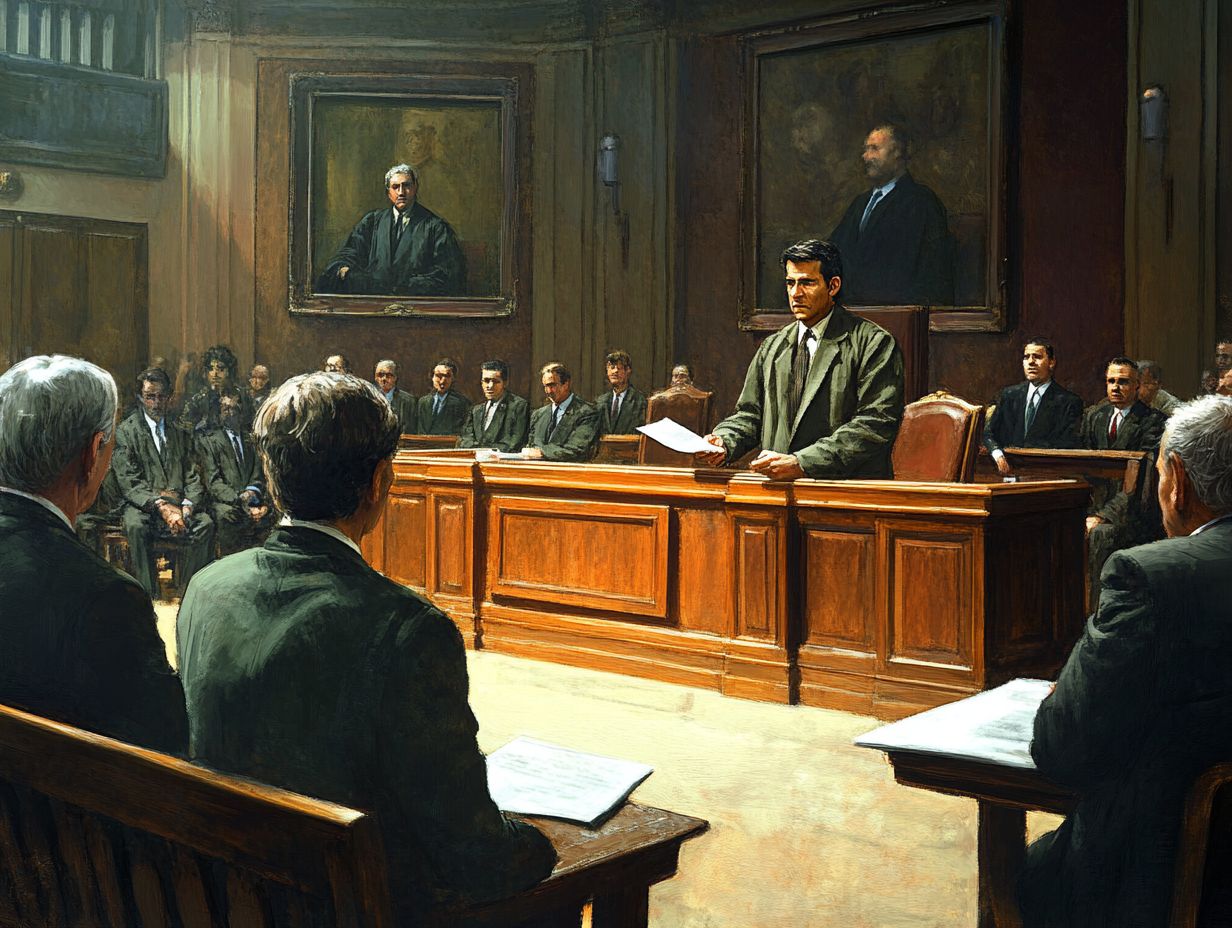
Numerous factors play a crucial role in determining how prior convictions affect an individual s criminal history and the legal consequences of any subsequent charges.
These factors include the severity of prior convictions, the amount of time that has passed since they occurred, and efforts to improve oneself that the defendant has actively pursued.
Severity of Convictions
The severity of previous convictions, whether felonies or misdemeanors, significantly influences your current legal standing and defense strategy.
If you re facing charges in court, having prior felony convictions can affect not only the severity of your sentencing but also your eligibility for diversion programs, which are typically available to those with minor misdemeanors.
Your defense attorney may focus on highlighting your efforts to improve oneself if your past infractions are less severe. This can showcase your commitment to change and persuade the judge to show leniency.
Conversely, if your history includes serious offenses, such as violent felonies, you might attract harsher scrutiny. This could impact plea negotiations and determine whether your attorney should advocate for a jury trial or seek alternative resolutions to lessen the potential consequences you face.
Time Since Convictions
The duration since your last conviction can significantly shape your criminal history. It influences how the legal process unfolds and the potential for rehabilitation efforts to soften the impact of legal repercussions.
When a considerable amount of time has passed since your previous offenses, it can often change how the court perceives your character. This time frame can be pivotal in crafting arguments for leniency, as it may suggest that you have genuinely reformed or grown.
You can demonstrate your commitment to self-improvement through various rehabilitation programs. These efforts not only express remorse but also highlight a proactive approach to reintegrating into society. This can positively influence judicial outcomes during sentencing discussions.
Rehabilitation Efforts
Efforts to improve oneself can play a crucial role in legal proceedings, potentially reducing the legal repercussions tied to past convictions and positively shaping perceptions of your criminal history.
By engaging in programs focused on personal growth like counseling, education, or vocational training you demonstrate your commitment to transformation and reintegration into society.
Courts increasingly recognize these proactive steps as meaningful signs of your willingness to change. This recognition may result in more lenient sentences or even alternatives to incarceration that focus on rehabilitation.
When the judicial system acknowledges your efforts, it reinforces a supportive narrative around rehabilitation. This encourages you to take responsibility for past actions and provides a genuine opportunity for a second chance at life.
Strategies for Addressing Prior Convictions in Defense
When addressing prior convictions in a criminal defense context, employing effective strategies is crucial for achieving the best possible outcomes.
This often involves careful disclosure, thoughtful mitigation tactics, and exploring potential avenues for expungement, which means removing a conviction from your record.
By navigating these aspects with precision, you can significantly enhance your chances of a favorable resolution.
Disclosure and Mitigation
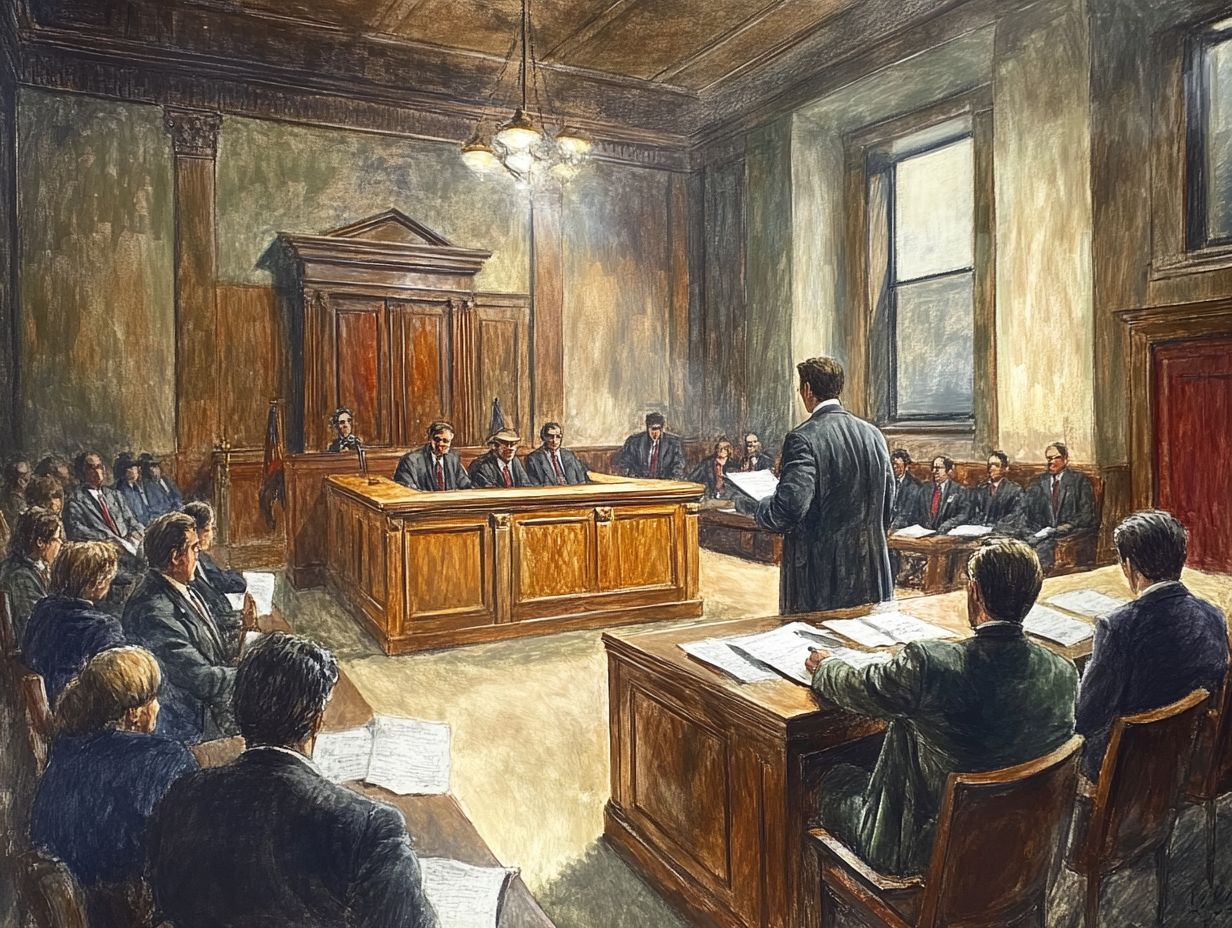
Disclosure and mitigation are essential elements of your defense strategy. They enable you to proactively address prior convictions while managing their potential impact on criminal charges. These components are crucial for shaping your legal defense, especially when facing bias from the opposing party.
Being open about past issues allows your defense team to strategically anticipate the arguments the prosecution may raise. This transparency helps in crafting a compelling narrative and enhances your credibility with the court.
Effective mitigation showcases your commitment to change, humanizing your situation in the eyes of those involved. Such proactive efforts can significantly sway negotiations, leading to more favorable outcomes or improved plea deals. This ultimately positions you in a stronger light against any adverse claims.
Take action now! If you are facing legal challenges due to prior convictions, consult a legal expert to explore your options for rehabilitation and defense strategies.
Expungement and Pardons
Pursuing expungement and pardons offers you a valuable pathway to clear your criminal record of prior convictions. This can significantly improve your legal standing and future opportunities.
These processes help erase the stigma tied to past mistakes. They also unlock better employment prospects and housing options.
Start by understanding if you qualify for expungement or a pardon. Eligibility can vary depending on where you live.
If you’re looking to enhance your life through these legal avenues, collaborating with knowledgeable attorneys can make a substantial difference. Their knowledge is essential to complete and submit your paperwork correctly while guiding you through the intricacies of the law.
The Importance of Legal Representation
The significance of having legal representation when navigating the intricacies of criminal cases cannot be emphasized enough.
Effective criminal defense is essential for securing the best possible outcomes in trials that may involve serious charges and complicated legal issues. Your choice of an adept attorney can make all the difference in steering you through this challenging landscape.
Role of Defense Attorney
The role of a defense attorney is incredibly multifaceted, involving the provision of legal advice, case analysis, and the strategic management of witness testimony and jury assessment to ensure you receive a fair trial.
Beyond these essential responsibilities, your defense attorney must dive into thorough investigations, gathering evidence that supports your case while potentially undermining the prosecution’s claims. They meticulously review police reports, interview witnesses, and prepare comprehensive arguments that illuminate discrepancies, all while staunchly advocating for your rights.
The defense attorney plays a key role in negotiations, exploring plea deals that could help mitigate any potential penalties you may face. This comprehensive approach not only serves your individual case but also upholds the integrity of the justice system, showcasing just how vital the defense attorney s role is in the broader criminal defense process.
Building a Strong Defense Strategy
A strong defense strategy is vital if you want to navigate the complex world of criminal defense successfully. Act quickly to consider trial evidence and witness credibility.
This multifaceted process involves not just analyzing the specific charges but also evaluating every piece of available evidence, including forensic data and documentation.
A strong grasp of how witness testimonies can influence a jury’s perception is paramount; credible witnesses can significantly bolster your defense position. The interplay between compelling evidence and reliable testimonies can be crucial in determining the outcome of a case.
Experts agree that examining plea options is crucial, allowing you to navigate the legal landscape strategically while minimizing potential penalties.
Frequently Asked Questions
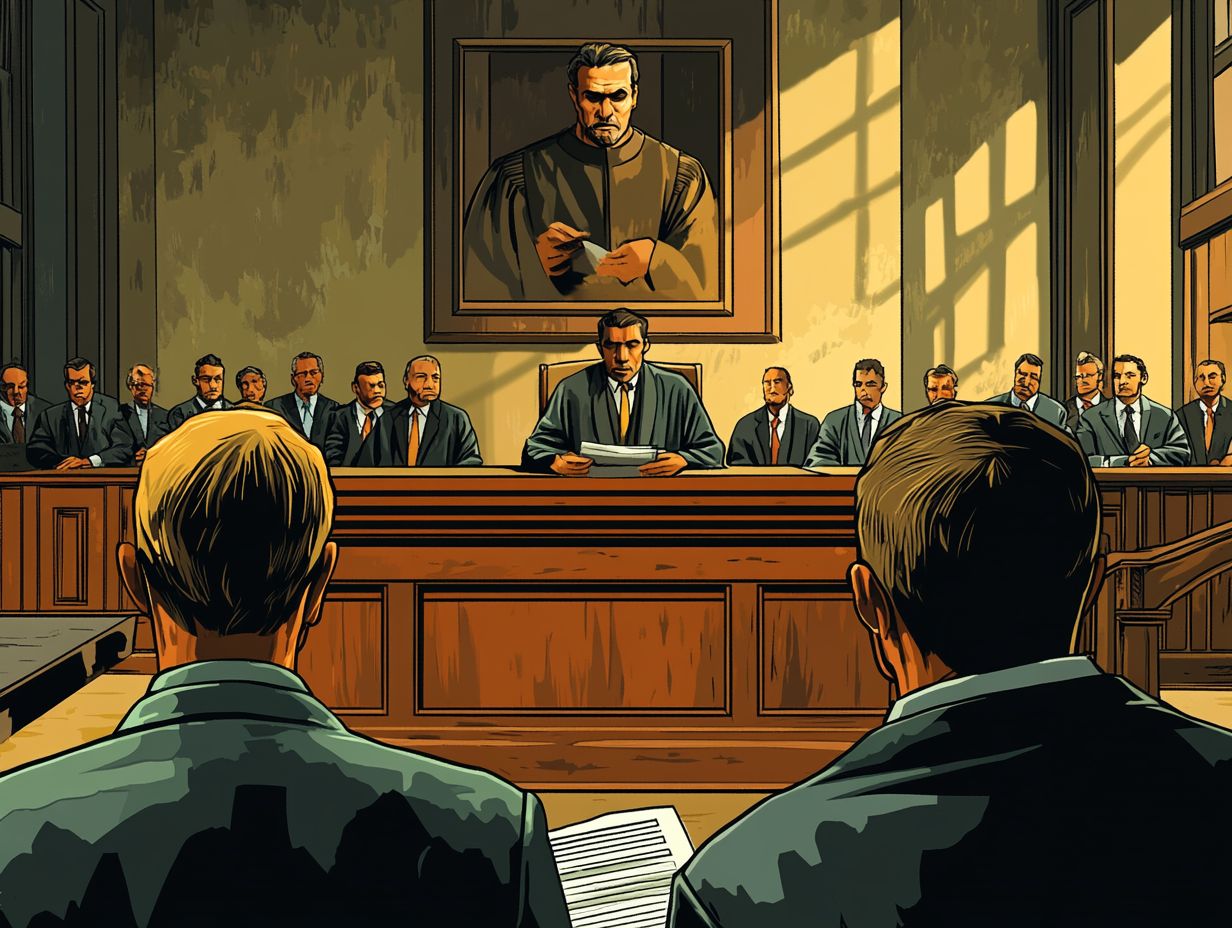
Curious about prior convictions?
What is the impact of prior convictions on a criminal defense?
The impact of prior convictions on a criminal defense can vary depending on the specific circumstances of the case. In general, having a prior conviction can make it more difficult for a defendant to present a strong defense and may result in harsher penalties if convicted, as highlighted in the discussion on the impacts of a criminal conviction.
Can prior convictions be used against a defendant in court?
Yes, prior convictions can be used against a defendant in court. Prosecutors often use them to establish a pattern of behavior and to argue for a harsher sentence. However, some states have laws that limit the use of prior convictions in court.
What types of prior convictions can be used against a defendant in court?
Generally, any prior convictions that are relevant to the current case can be used against a defendant in court. This can include convictions for similar offenses, as well as more serious or violent crimes. However, the admissibility of prior convictions may vary depending on the state and the type of offense.
If you have more questions, don t hesitate to reach out for legal advice. Your future matters.
How can prior convictions impact a defendant’s credibility as a witness?
Prior convictions can significantly affect a defendant’s credibility as a witness in their defense. The prosecution uses prior convictions to attack the defendant’s character, making it harder for a jury to believe their testimony.
Can a defendant’s prior convictions be expunged or sealed?
Defendants can sometimes expunge or seal their prior convictions, but the rules differ by state. This process can reduce the impact of those convictions, but the record may still be used in certain situations.
How can a criminal defense lawyer help with prior convictions?
A criminal defense lawyer works to lessen the effect of prior convictions. They can challenge whether these convictions can be used, advocate for lighter sentences, and create a strong defense strategy.

